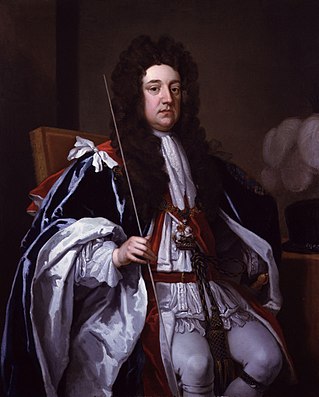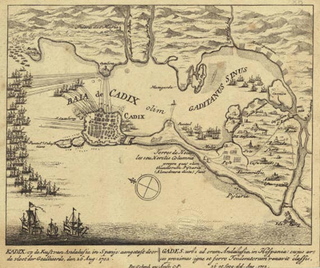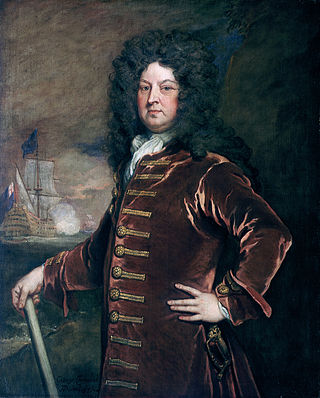Incumbents
- Monarch – William III (until 8 March), Anne (starting 8 March)

| |||||
| Centuries: | |||||
|---|---|---|---|---|---|
| Decades: | |||||
| See also: | Other events of 1702 | ||||
Events from the year 1702 in England . This year sees a change of monarch.


Duke of Marlborough is a title in the Peerage of England. It was created by Queen Anne in 1702 for John Churchill, 1st Earl of Marlborough (1650–1722), the noted military leader. In historical texts, unqualified use of the title typically refers to the 1st Duke. The name of the dukedom refers to Marlborough in Wiltshire.

1702 (MDCCII) was a common year starting on Sunday of the Gregorian calendar and a common year starting on Thursday of the Julian calendar, the 1702nd year of the Common Era (CE) and Anno Domini (AD) designations, the 702nd year of the 2nd millennium, the 2nd year of the 18th century, and the 3rd year of the 1700s decade. As of the start of 1702, the Gregorian calendar was 11 days ahead of the Julian calendar, which remained in localized use until 1923.

Anne was Queen of England, Scotland, and Ireland from 8 March 1702, and Queen of Great Britain and Ireland following the ratification of the Acts of Union 1707 merging the kingdoms of Scotland and England, until her death in 1714.

General John Churchill, 1st Duke of Marlborough, 1st Prince of Mindelheim, 1st Count of Nellenburg, Prince of the Holy Roman Empire, was an English soldier and statesman. From a gentry family, he served as a page at the court of the House of Stuart under James, Duke of York, through the 1670s and early 1680s, earning military and political advancement through his courage and diplomatic skill. He is known for never having lost a battle.

Blenheim Palace is a country house in Woodstock, Oxfordshire, England. It is the seat of the Dukes of Marlborough. Originally called Blenheim Castle, it has been known as Blenheim Palace since the 19th century. One of England's largest houses, it was built between 1705 and 1722, and designated a UNESCO World Heritage Site in 1987.

Sarah Churchill, Duchess of Marlborough, Princess of Mindelheim, Countess of Nellenburg, was an English courtier who rose to be one of the most influential women of her time through her close relationship with Anne, Queen of Great Britain. The Duchess of Marlborough's relationship and influence with Anne were widely known, and leading public figures often turned their attentions to her, hoping for favour from Anne.

Sidney Godolphin, 1st Earl of Godolphin, was an English Tory politician and peer. He was a Privy Councillor and Secretary of State for the Northern Department before he attained real power as First Lord of the Treasury. He was instrumental in negotiating and passing the Acts of Union 1707 with Scotland, which created the Kingdom of Great Britain. He had many other roles, including that of Governor of Scilly.

This is a list of the principal Ministers of the Crown of the Kingdom of England, and then of the Kingdom of Great Britain, from May 1702, at the beginning of the reign of Queen Anne. During this period, the leaders of the ministry were Lord Godolphin and the Duke of Marlborough.

The first Parliament of the Kingdom of Great Britain was established in 1707 after the merger of the Kingdom of England and the Kingdom of Scotland. It was in fact the 4th and last session of the 2nd Parliament of Queen Anne suitably renamed: no fresh elections were held in England or in Wales, and the existing members of the House of Commons of England sat as members of the new House of Commons of Great Britain. In Scotland, prior to the union coming into effect, the Scottish Parliament appointed sixteen peers and 45 Members of Parliaments to join their English counterparts at Westminster.

The 2nd Parliament of Great Britain was the first British Parliament to actually be elected, as the 1st Parliament of Great Britain had been drawn from the former Parliament of England and Parliament of Scotland.

The Battle of Cádiz was an attempt by English and Dutch forces to seize the southern Spanish port of Cádiz in 1702 during the War of the Spanish Succession. The Andalusian port of Cádiz served as the centre of Spanish trade with its American colonies. As such, the port's capture would not only help to sever Spain's links with her empire in the Americas, but it would also provide the Allies with a strategically important base from which the English and Dutch navies could control the western Mediterranean Sea.

Admiral of the Blue George Churchill was an English naval officer, who served as a Lord Commissioner of the Admiralty from 1699 to 1702 and sat on the Lord High Admirals Council from 1702 to 1708. He was Member of Parliament for St Albans from 1685 to 1708, then Portsmouth from 1708 until his death in 1710.
Sir Solomon de Medina was an army contractor for William III and the first Jew to be knighted in England.
Events from the year 1709 in Great Britain.
Events from the year 1704 in England.

Anne Churchill, later Anne Spencer, Countess of Sunderland, was an English court official and noble. She once held the office of Lady of the Bedchamber to Queen Anne.

The capture of Gibraltar by Anglo-Dutch forces of the Grand Alliance occurred between 1 and 4 August 1704 during the War of the Spanish Succession. Since the beginning of the war the Alliance had been looking for a harbour in the Iberian Peninsula to control the Strait of Gibraltar and facilitate naval operations against the French fleet in the western Mediterranean Sea. An attempt to seize Cádiz had ended in failure in September 1702, but following the Alliance fleet's successful raid in Vigo Bay in October that year, the combined fleets of the "Maritime Powers", the Netherlands and England, had emerged as the dominant naval force in the region. This strength helped persuade King Peter II of Portugal to sever his alliance with France and Bourbon-controlled Spain, and ally himself with the Grand Alliance in 1703 as the Alliance fleets could campaign in the Mediterranean using access to the port of Lisbon and conduct operations in support of the Austrian Habsburg candidate to the Spanish throne, the Archduke Charles, known to his supporters as Charles III of Spain.

John Churchill, Marquess of Blandford was a British nobleman. He was the heir apparent to the Dukedom of Marlborough – as the only surviving son of John Churchill, 1st Duke of Marlborough, an accomplished general, and Sarah Churchill, Duchess of Marlborough, a close friend of Queen Anne. Blandford died childless in 1703, and upon his father's death in 1722, the dukedom passed to his eldest sister, Lady Henrietta Godolphin.
Queen Anne is a 2015 play by the British playwright Helen Edmundson on the life of Anne, Queen of Great Britain. It is set between just before her accession in 1702 and her husband George's death in 1708 and centres on the relationship between Anne and her close friend Sarah, Duchess of Marlborough, by whom Anne was heavily influenced in the period before and during her reign.

The 1st Parliament of Queen Anne was summoned by Queen Anne of England on 2 July 1702 and assembled on 20 August 1702. Its composition was 298 Tories, 184 Whigs and 31 others, representing a large swing to the Tories since the previous election. Robert Harley, the member for Radnor, was re-elected Speaker of the House of Commons.